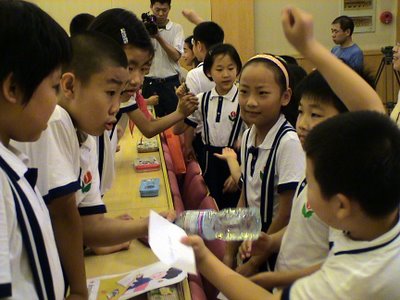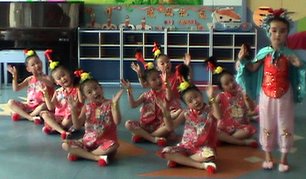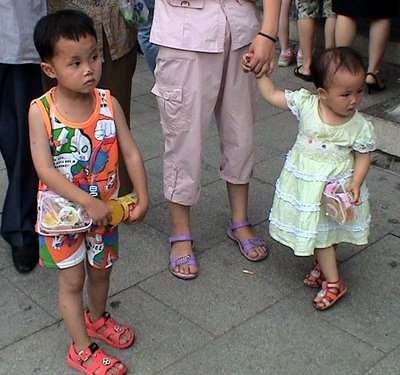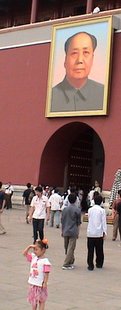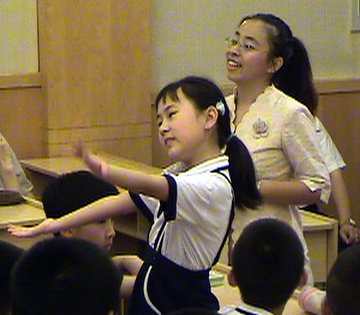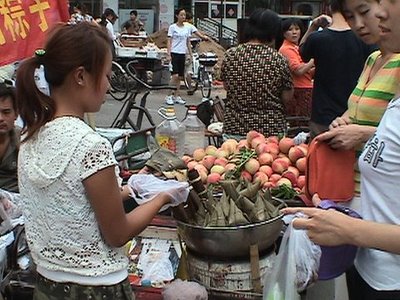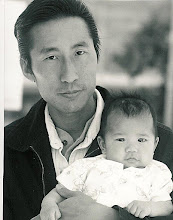
Sunday, December 31, 2006
Monday, December 18, 2006
 Our school district was honored today by a visit by Minister Bai Junming of the Harbin Education Bureau and 24 teachers, principals and educators from the beautiful Northern China City of Harbin. Also known as Little Moscow because of its connections with Russia and northern Asian and European cultures, Harbin is known as the ICE CITY beause of the amazing ice sculptures and structures during the Winter Time.
Our school district was honored today by a visit by Minister Bai Junming of the Harbin Education Bureau and 24 teachers, principals and educators from the beautiful Northern China City of Harbin. Also known as Little Moscow because of its connections with Russia and northern Asian and European cultures, Harbin is known as the ICE CITY beause of the amazing ice sculptures and structures during the Winter Time.Addressing the visitors I said that delegations like these allow educators from the US and China to share experiences and dialogue to help build US and China People's Friendship for the future, not just for mutual trade and business, but also to help move us toward world peace and global justice.
For more info http://www.uscpfa.org/
or http://www.sfusd.edu
 Walden Bello Interview with IFG's Dale Wen: “China Needs an Ecologized Social Democratic System.”
Walden Bello Interview with IFG's Dale Wen: “China Needs an Ecologized Social Democratic System.”Thursday, 30 November 2006
By Walden Bello*
Dale Wen's short book China Copes with Globalization: a Mixed Review, published by the International Forum on Globalization, is probably the best comprehensive introduction to the environmental and social impacts of China's breakneck industrialization available in English (http://www.ifg.org/) Based on both Chinese and non-Chinese sources, the report carefully reviews China's economic policies from Mao to the present leadership, discusses the consequences of the economics of the reform era from 1978-92, analyzes the globalization of the economy since 1992, and surveys the alternative voices in the Chinese scene, including the environmental movement and the "New Left."
Born and raised in China, Dale obtained her Bachelor of Science degree from the University of Science and Technology of China in Anhui province and her PhD from the California Institute of Technology. Currently an associate of the International Forum on Globalization (IFG), she worked in Silicon Valley's high tech industry before moving to non-profit work. Her writings on China's development and environment have appeared in a number of publications. She travels frequently to China, where she maintains close ties with China's emerging civil society.
Thursday, October 12, 2006
Also, a fond farewell to International Forum on Globalization researcher/activist Dale Wen as she relocates from our fair City of SF to New York City.
I have found the work of Dale Wen very helpful. Dale's great analysis China Copes with Globalization for the International Forum on Globalization is excellent.
I especially liked her analysis of China's changing workforce, health care system, and on growing poverty and inequality were very helpful, as was the section on China's diverse 'New Left'.
Wen has a great website as well - Dale's China Page
Monday, August 21, 2006

A few SEIU friends and other labor leaders from SF and other parts of the US and Canada have just returned from a delegation to China which included many intense meetings with the All-China Federation of Trade Unions (ACFTU) and historic building of labor solidarity and new global relationships with the world's largest union.
Here's background from the Action LA labor watch site -
After Long Campaign, Chinese Union Will Unionize All Wal-Mart Outlets
Labors Watch China - Projects of ActionLA Coalition
August 19, 2006
1) Wal-Mart sets up 19 trade unions in Chinese outlets (People's Daily, China)
2) Wal-Mart Bows Down to China (Ohmy News, South Korea)
3) Wal-Mart's Union (Andy Stern, SEIU, USA)
1) Wal-Mart sets up 19 trade unions in Chinese outlets
August 19, 2006
People's Daily (China)
FULL ARTICLE
The world's retail giant Wal-Mart has established 19 trade unions in its Chinese outlets since late July, disclosed an official of the All-China Federation of Trade Unions (ACFTU) on Friday.
"The negotiations between Wal-Mart and the ACFTU have proved fruitful. The two sides have agreed to set up trade unions in Wal-Mart Chinese outlets on a cooperative and harmonious basis and in line with Chinese laws," an ACFTU official said Friday in an interview with Xinhua.
The two sides agreed that the candidates for trade union posts in a Wal-Mart Chinese outlet should be approved by a higher-level trade union after work staff's nomination.
...Wal-Mart opened its first outlet in China in 1996. Until July 29 this year, no Wal-Mart Chinese outlets had set up trade unions.
The world's leading retailer has some 1.6 million employees in 16 countries and regions. And Wal-Mart's 60 Chinese outlets employ 23,000 people.
Wal-Mart has traditionally not allowed trade unions in its outlets, for which it has been widely criticized by human rights groups and labor organizations.
With mounting pressure from the ACFTU and the public, Wal-Mart China backed down in 2004 by saying in a statement that "Should associates request the formation of a union, Wal-Mart China will respect their wishes and honor its obligations under China's trade union law."
On July 29, its outlet in Jinjiang City, east China's Fujian Province, set up a trade union. In the following 20 days, another 18 trade unions were established in Wal-Mart's outlets in the cities of Shenzhen, Nanjing, Fuzhou, Jinan, Shenyang, Dalian, Nanchang, Qingdao, Wuhan and Taiyuan.
...
2) Wal-Mart Bows Down to ChinaAfter a long fight the American giant allows trade unions in all 60 of its Chinese supermarkets
Ohmy News, South Korea
August 14, 2006
FULL ARTICLE
Xu Zhiqiang (xuzhiqiang)
...
3) Wal-Mart's Union
Andy Stern, President, Service Employee International Union (SEIU), USA.
August 17, 2006
FULL POST AT www.huffingtonpost.com
Well, I went to my first unionized Wal-Mart; unfortunately it had to be in China
for the experience.
Three decades ago, with over 800 million people in farming and state-owned enterprises aging, China initiated a series of economic reforms. They chose to do what Russia failed to do: open itself to the idea of investment and what went along with it.
In opening its market, China made investment king -- and other than political stability -- it trumped all other considerations.
Today the Chinese government is feeling more and more confident in its dealings with multinational corporations, or Foreign-Owned Enterprises (FOEs). Once FOEs became a necessary and revered source of investment, they could do no wrong.
For big business, despite all their claims of wanting to promote democracy, the 1.3 billion-person Chinese market plus a dominant and stable government was too hard to resist in this new era. So throwing 20th century values to the wind, the corporate money rolled in, particularly along the eastern coast.
The financial capital Shanghai (and China's New York) constructed as much office space as Manhattan in 2005 alone. Half of the world's concrete was poured in China last year. By the 2008 Olympics, 110 new hotels will open for business in Beijing.
And last month, I said month, China reported a $10 billion trade surplus.
Wal-Mart simply overplayed their hand.
The Chinese Constitution allows workers the right to have unions by simply applying for recognition. The union tried to find, as they would say, "harmonious relations" with management, but Wal-Mart rebuffed them as they have unions everywhere. For two years the All-China Federation of Trade Unions (ACFTU) made efforts to organize workers, and Wal-Mart still resisted - that is, until the government and the union joined forces.
The workers stepped forward and Wal-Mart was "persuaded" to allow the workers' desire to be recognized. Today there are 16 stores organized, and growing interest in the union.
It's a huge signal not only to Wal-Mart, but also to multinational corporations and FOEs that investment was once supreme, but stability, workers, and the rule of law is now getting more attention. The ACFTU believes it will go from 30-40 percent union recognition in the private sector to 80-90 percent by 2008.
Today's lesson is that a more confident China is willing to set the rules on investment, and no employer is big enough to ignore them.
Tomorrow - what does this mean for the workers?
Wednesday, August 16, 2006
* STAND UP AGAINST ANTI-IMMIGRANT LAWS!
* EQUAL RIGHTS AND DIGNITY FOR ALL IMMIGRANTS!
Globalization and Imperialism Fuel Global Migration
Following NAFTA in 1994, millions of Mexican communities were forced off their land and were
given no other option to provide for their family than to risk their lives to find work in the U.S. In China, similar free trade policies have impoverished and displaced over 120 million farmers and migrant workers. Faced with long waiting lists and barriers to legal immigration, over 11 million undocumented immigrants, including nearly 1 million from China, have come to the U.S. in recent decades seeking a better life. The U.S. government’s response to the consequences of their own neo-liberal trade pacts has been to militarize the U.S./Mexico border and criminalize the very people that they displaced: immigrant workers.
Today's Anti-Immigrant Laws Mirror the Anti-Chinese Laws of the 1800's
In 1882, the U.S. government passed the Chinese Exclusion Act to ban immigration of Chinese
workers to the U.S. and prohibit Chinese immigrants from becoming naturalized citizens. This
discriminatory law was eventually expanded to exclude all Asian immigrants and was not fully
reversed until 1965. To pass these laws, racist politicians blamed Asian immigrants for "stealing" jobs from white Americans. Today, similar arguments are used by racist politicians to push new antiimmigrant laws such as HR 4437.
We Are All Immigrants
Right wing groups and politicians have focused their recent attacks on undocumented immigrants. Regardless of your immigration status, this is just a way for the Bush administration to divide us and undermine the rights of all immigrants. In 1994, Prop 187 excluded undocumented immigrants in California from social welfare benefits. Two years later, the U.S. government cut off most legal immigrants from public health care, food stamps and cash assistance programs for the needy.
We Demand COMPREHENSIVE Immigration Reform
The Chinese Progressive Association stands with communities across the entire nation, and
throughout the world demanding full equality and dignity for immigrant workers. We call on our
senators and representatives to say NO to enforcement-only legislation such as HR 4437 and to
support comprehensive immigration reform that will:
-Provide the opportunity for undocumented immigrants to legalize their status
-Expand avenues for legal immigration and support family reunification
-Strengthen labor protections and their enforcement for all workers, both native and foreign
born
-End neo-liberal trade policies that impoverish and displace farmers and workers in
developing countries and fuel global migration
Tuesday, July 25, 2006

VICTORY - Hao Wu Freed - New American Media has just come out with a decent article on Blogger/Filmmaker Hao Wu's ordeal in Beijing - locked up from Feb 22 to July 11. His film Beijing or Bust chronicled the experiences of a handful of Chinese Americans that relocate to Beijing and other cities in Chinese to live.
Bloggers Help Free Chinese Filmmaker
New America Media, News Analysis, Eugenia Chien, Jul 25, 2006
Editor’s Note: Thanks in large part to bloggers, Chinese blogger and filmmaker Hao Wu is finally freed after spending nearly five months in a Beijing jail. While China is trying to crack down on Internet dissidents, notes NAM writer Eugenia Chien, the Internet community is fighting back, despite the obvious risks.Full post
When Chinese filmmaker Hao Wu did not show up on Feb. 22 to meet a friend at the gym in Beijing, the Internet community jumped into action. A picture of Wu on a shocking red background and bright yellow text that said “Free Hao Wu” soon popped up on hundreds of blogs in China as well as around the world.
Within weeks, about 1,000 websites carried the picture of Wu, which linked to a website called FreeHaoWu.com where information about the case was constantly updated. It was a virtual version of going block by block to post fliers for a missing person.
Wu, a Chinese citizen with U.S. permanent residency, was finally released on July 11 after nearly five months in detention. His case is a testament to the power of the blogging community to generate information and gather support. With an estimated 60 million bloggers in China, blogs have become a powerful tool of social support for causes ranging from feminism to freedom of speech.
Tuesday, July 18, 2006
 Jooksing is now on vacation in the REAL OC -
Jooksing is now on vacation in the REAL OC -Anaheim - Disneyland Garden Grove Westminster [talk about a huge Asian American community down here] and visiting my nephew and niece and other family in Southern Orange county;
And for the past few days we have been enjoying Los Angeles' south bay - [it's so great to have a sister-in-law down here]
Torrance [there's a great Buddhahead hangout - Marukai]
Hermosa Beach, Redondo Beach and Manhattan Beach - weather is heavenly out here.
Loved the amazing sunset yesterday at Manhattan Beach; and the morning sunrise at Hermosa Beach pier today.
And this afternoon I am visiting Santa Monica Pier with my 6 year old Jade and visiting my sister in Pacific Palasades as well.
Back home driving up I-5 tomorrow morning through the blistering Central Valley to the SF/Oakland Bay Area and cool summer weather again.
We will resume here in a few days...
http://edjustice.blogspot.com
Wednesday, July 12, 2006
More reflections on my China trip -
As I continue to sort out my thoughts on the challenges of China's massive school system, the impact of corporate globalization on the Chinese people, and folks in the US, and my personal feelings of going to China for the first time - I have been reviewing current documentaries on China's politcal and economic development.
Discovery/Times, Canandian Broadcasting's 2006 series China Rises and Hao Wu's Beijing or Bust were useful, but the most insightful documentaries were Carma Hinton's moving and constructively critical Morning Sun [2003 - on the Great Proletarian Cultural Revolution 1964-76 and the potenial of China's youth] and The Gate of Heavenly Peace [1995 - on the 7-week long Tiananmen Square protests of April-June 4, 1989 and the brutal government crackdown]. I rewatched Heavenly Peace last night, all 3 hours of it. It is gut wrenching but gives a very insightful understanding of the complexity of the struggle for people's democracy and development in China and the mistakes of the party and the student and worker and intellectual leaders of the time. The companion websites for both documentaries are incredible educational resources as well.
I have also found a few blogs helpful in understanding how others view China today.
Mike Downs - China and Beyond offers a refreshing view of the school system in China and how the government is trying to work with schools, especially private schools to promote exchange programs. Downs is the Principal of a private school in St. Paul, MN. Apparently, before our delegation of mostly public school folks, HANBAN had sponsored a trip of private school educators in the US in what they called the China Connection project, a partnership between NAIS [the US association of private schools] and HANBAN, a non-governmental organization (NGO) funded by the Chinese government, with a goal of advancing the teaching of the Mandarin language in schools in the United States.
Our Chinese hosts in Jinan and in Beijing, like the HANBAN officials, Vice-Chair Prof. Xu Jialu, and others gave a similar perspective to our delegation as well. Before our trip though, Consul-General Peng Keyu and his chief education advisor, an official from the PRC's ministry of education invited our SF delegation to the Chinese Consulate in SF. They were very open with us about the huge challenges of the Chinese education system and the millions of people that are being displaced by the modernization efforts and the growing inequalities in not just between rural and urban, but also in the cities themselves. They were also very frank about the growing privatization too in their public education system there.Wang, Dinghua, PhD of the Basic Education Department, Ministry of Education, PRC is telling us a story. "My daughter's math teacher told her that the new textbook is terrible. 'Don't use this awful new book,' he said, 'I will tell you which book to buy in the store.'"
...Wang is a key player in designing and implementing major reforms in China's education policy. He is in the midst of a presentation to us that describes in detail the problems with the Chinese system and how the new reforms are being modeled on the American system.
One of his slides reads in bold letters, WHAT CAN WE LEARN FROM AMERICAN EDUCATION? Another reads simply, STUDENT LEARNING: active learning, interactive ability, hands-on ability, how to fish instead of giving fish. The last one refers, of course, to the adage "give a man a fish, you feed him for a day, teach him to fish and you feed him for a lifetime." Put another way, "we don't teach students what to think, we teach them how." ..But perhaps an equally important strength of the system is revealed in the very existence of this reform process, and that the ministry, at least according to Wang, is implementing reforms based on a critical self-examination.
In retrospect, I am understanding better now that I am back how our trip, and others funded by HANBAN, fits into China President Hu's 6 goals for stronger US/China cooperation laid out in his April 21 speech to Yale University:
Fifth, Hu said the two nations should draw on each other's strengths, and strengthen friendly exchanges between the two peoples.
"China and the United States both have cultures that we take pride in and they have both made contribution to the human civilization and progress of mankind," Hu said.
"Therefore, China and the United States should step up cooperation in science and technology, culture and education, increase exchanges between our youths, media and think tanks and expand friendly exchanges between our provinces and cities," the president said.
Sixth, Hu said, the two sides should respect each other, treat each other as equals and view differences in a proper context and manage them properly.
China, in line with its national conditions, will continue to reform its political structure, develop socialist democracy, expand citizens' orderly participation in political affairs and ensure that people exercise democratic election, democratic decision making, democratic management and democratic monitoring in accordance with the law, the president said.
China takes human rights seriously, he stressed. The country respects and upholds human rights and this has been written into China's Constitution.
China will keep advancing human rights in the course of its social development. ...
"Due to different national conditions, it is normal for China and the United States to disagree on some issues," President Hu said. "We should seek common ground while shelving differences, conduct consultation on an equal footing and promote mutual progress through exchanges," he said.
Tuesday, July 11, 2006
I grew accustomed to the Baijiu on our delegation to Jinan because the Chinese teachers, principals and educators kept saying "gom-bay" and kept filling our wine and Baijiu glasses, and toasting toasting toasting... We usually slept well after those banquets, but the mornings were a bit difficult to wake up.
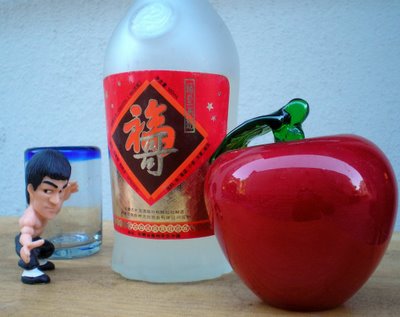
Now that I am free of my summer school teaching, I can concentrate on school board issues and something also called vacation. I go to LA for a few days to join the rest of my family, and then back to the City to play tourist as well. One place I want to explore more is the Presidio in SF. Here's a shot I took of the father of film at George Lucas' spanking new Digital Arts Center in the Presidio. The dome of the Palace of Fine Arts, which houses our City's incredible learning center the Exploratorium, is in the background. The site is also where San Francisco showed off its post 1906 earthquake rebirth at the Panama Pacific Worlds Fair in 1915.
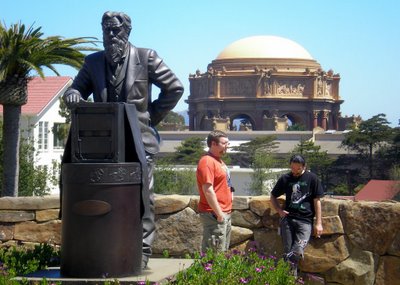
I also hope to get some multicultural eating in as well. A few days ago after the fog had started to blow in in the late afternoon in the Richmond District I walked to a little family run Russian restaurant down the street on Balboa and 6th Avenue called Cinderella Bakery and Cafe. They also have a great bakery as well. My 6 year old always asks where the real Cinderella [disney's version] is, and I tell her that this is the real thing. The meal was so awesome I had to take a photo of it, and the great Baltika 5 beer too...
I love San Francisco! Even though my neighborhood - the Richmond District - is considered by many as the NEW CHINATOWN in SF, I see it as a multiethnic enclave with many different cultures and groups of people.


Monday, July 10, 2006
This photo shows me with a few other members of the Jinan delegation from the United States standing in Tiananmen Square with Mao looking over my shoulder from the massive Gate of Heavenly Peace which is the entrance to the Forbidden City of Chinese emperors. Carma Hinton's insightful film The Gate of Heavenly Peace and the companion website gives a very good modern overview of the political shifts in China up to the mid-1990's when the film was done.
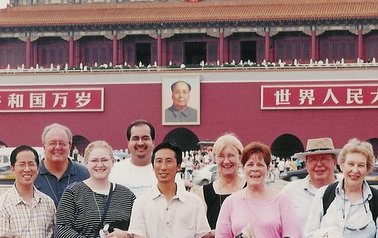 What happened to some of the Tiananmen Student Leaders?
What happened to some of the Tiananmen Student Leaders?On June 30th I also visited Beijing Normal University, one of the hot spots for student activism of the late 1980's. But the many students I talked with had no consciousness of Tiananmen, they just served as cheerful guides for our US delegation.
For info on the student leaders of 1989 -
The website for Hinton's film even gives some background on what happended to Wang Dan, Wuer Kaixi, and Chai Ling, the main student leaders from Beijing Normal University and Beijing University in 1989.
Unlike his colleagues Wang stayed in China after the Tiananmen Massacre and was jailed beginning on July 2, 1989, and then again from 1991 to 1993. He was released on parole in February 2003, but soon afterwards detained again in May 2003 for participating in petitions calling for the release of all prisoners arrested in connection with the June 4th movement. In 1996 he was sentenced to 11 years in prison for subversion.
Luckily he was released on medical parole in 1998 and went into exile in the United States. He has probably completed his Ph.D. now in history at Harvard.
Wuer hosts a radio talk show in Taiwan.
Chai, the student who had reportedly advocated bloodshed and had denounced many other student leaders who were seeking to negotiate with the Chinese government officials for the students to peacefully leave the square before the violent crackdown on June 4, 1989, now owns Jenzabar, an internet company with her husband and has had numerous conflicts with folks from the Harvard Business School to former executives from her own company.

Saturday, July 08, 2006
Friday, July 07, 2006
The schools we visited in Jinan, the Capitol of Shandong Province in China on Monday seemed better-resourced than many of our schools in the San Francisco/Oakland Bay Area. Today I met with San Francisco middle school students who will be entering many of our high schools next year like Lowell, Galileo and Lincoln. A few are going on to private and parochial schools as well. The students are participating in a great program called SummerBridge.The 2 Jinan schools we visited, Jinan Primary School and Jinan #2 High ...
for more click here
Thursday, July 06, 2006
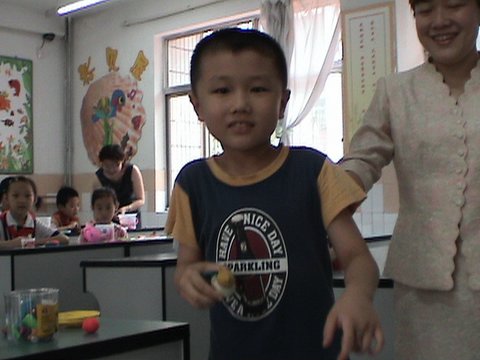
This little guy introduced himself as 'Richard.' I told him my father had been named Richard too. He was born in Guangzhou, China but left for the United States as a baby in 1919 and never returned. The boy gave me a little cat made of playdough. He made me think a lot about my father who passed away in 2004.
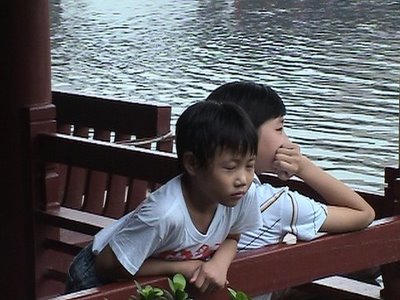
Children enjoying the soothing and peaceful water at one of Jinan's amazing natural spring parks.
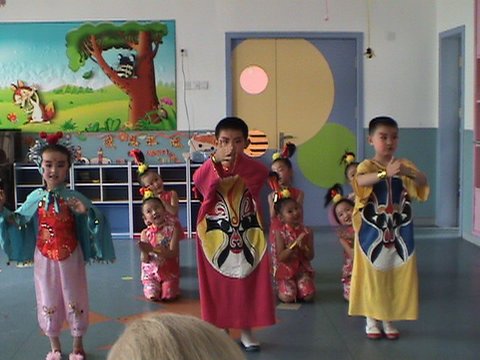
Jinan elementary school children performing Chinese Opera.
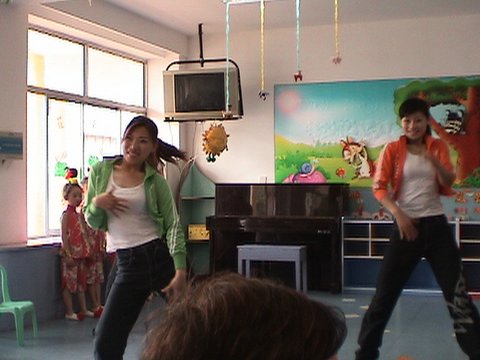
Jinan kindergarten teachers performing modern Chinese dances for our Shandong schools delegation from the United States. Now why couldn't I have had kindergarten teachers like them while I was growing up... :-)

Students from Jinan experimental high school
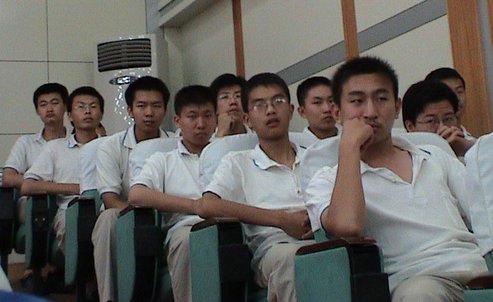 Dad with son digging his nose on a Monday morning in Shanghai
Dad with son digging his nose on a Monday morning in Shanghai Shanghai's Government Brand Cigarettes compete with Marlboro for the masses
Shanghai's Government Brand Cigarettes compete with Marlboro for the masses
Kids play at the extremely modern and westernized Shanghai international airport


Wednesday, July 05, 2006
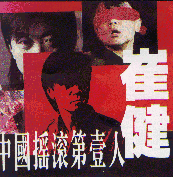 CHINA 2006 - iPod labor, Cui Jian - China's rock legend, songs and thoughts
CHINA 2006 - iPod labor, Cui Jian - China's rock legend, songs and thoughtsOn father's day, before my trip, my partner Sandi bought me one of those new iPods that hold a ton of video and audio files. I packed in a bunch of podcasts about China, Mandarin, etc. in addition to about 2500 songs.
I also realize that companies like Apple are reaping tremendous profits from factories in China which produce the little machines from the labor of workers in China who are usually pulled from rural areas to work in new urban economic zones opened up by China's rush to modernization and the WTO/World Bank/and TNC's efforts to open up 'free' markets in China. The iPods in China cost as much as they do here which means that only a tiny sliver of the people there can actually purchase them.
Songs - Cui Jian to Bob Dylan and UB40
Besides my Cui Jian Chinese rock and roll and other songs from a changing China, I listened to one of my iPod playlists which I also burned on a CD to give to my hosts.
Cui is the Bob Dylan of Chinese Rock. Banned for 13 years after the Tiananmen Square massacre, his 80's anthem "Nothing to My Name" is still an inspiration to me.
I am giving you my aspirations
And my freedom too.
But you always
laugh at me
Because I have nothing
Some of the songs I brought to China included -
TOMMY JAMES AND THE SHONDELLS lyrics - "Crystal Blue Persuasion" [1969]
Look over yonder what do you see The sun is a-risin' most definitely A new day is comin' people are changin' Ain't it beautiful crystal blue persuasion… Maybe tomorrow when He looks down Every green field and every town All of his children every nation There'll be peace and good brotherhood Crystal blue persuasionSing Our Own Song - UB40 [2000]
The great flood of tears that we`ve cried For our brothers and sisters who`ve died Over four hundred years Has washed away our fears And strengthened our pride Now we turn back the tideI shall be released - Bob Dylan and the Band [from the Last Waltz]
We will no longer hear your command We will sieze the control from your hand
We will fan the flame Of our anger and pain And you`ll feel the shame For what you do in gods name
We will fight for the right to be free
We will build our own society
And we will sing, we will sing
We will sing our own song
When the ancient drum rythms ring The voice of our forefathers sings Forward
Africa run Our day of freedom has come For me and for you Amandla Awethu!
They say ev'rything can be replaced, Yet ev'ry distance is not near. So I rememberLove And Hope – Ozomatli [2004 - Street Signs]
ev'ry face Of ev'ry man who put me here. I see my light come shining From the west unto the east. Any day now, any day now, I shall be released.
A child looks up into my eyes, nothing to say. An open hand with scars can hide the pain away. What I can give is not enough to help him grow. How can I fulfill his needs, embrace his soul?
The hope deep in his eyes are dreams he must let fly! So sing this song with me. this hopeful melody.
Chorus: Just raise your head up and stand up, no fear in your eyes.
Tell me love and hope never die. So raise your head up and stand up, no reason to cry. 'Cause your heart and soul will survive.
The child struggled to survive. Now he's a man. With children of his own, he does the best one can. He tries to live with love and not let sorrow grow, even though he barely reaps all that he sows.
The hope deep in his eyes are dreams he must let fly! So sing this song with me.
This hopeful melody.
[Chorus]
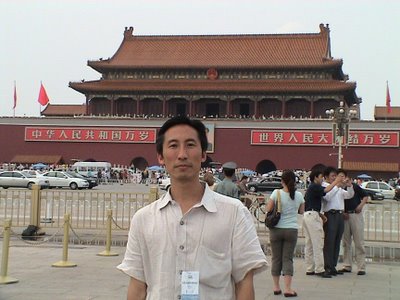 In front of the Forbidden Palace. My head blocks Mao's 22 foot oil painting image.
In front of the Forbidden Palace. My head blocks Mao's 22 foot oil painting image. In the Forbidden City.
In the Forbidden City. A lovely performer at the Jinan Primary school welcomes the visitors from the West.
A lovely performer at the Jinan Primary school welcomes the visitors from the West. Ms. Ma is the principal of Jinan Primary School. The principal of the high school we visited was also named Ma. Ma is my surname as well.
Ms. Ma is the principal of Jinan Primary School. The principal of the high school we visited was also named Ma. Ma is my surname as well. 

Children from Jinan's Primary School performing at their school for the American Delegation. The School was founded in 1903. The principal, Ms. Ma, talked about the impact of the May 4th [1919] movement on the Chinese people's consciousness. A huge picture of leftist intellectual writer Lu Hsun stood in doorway of the school.
 Jinan No. 2 High School, one of the country's experimental schools attracts the best and the brightest from Shandong. Actress Gong Li attended this school. Various slogans on the walls of the classrooms emphasized - ENTHUSIASM, DEMOCRACY, INDEPENDENCE, SELF-ESTEEM, PARTICIPATION, CONFIDENCE, DILIGENCE, and SELF-MANAGEMENT.
Jinan No. 2 High School, one of the country's experimental schools attracts the best and the brightest from Shandong. Actress Gong Li attended this school. Various slogans on the walls of the classrooms emphasized - ENTHUSIASM, DEMOCRACY, INDEPENDENCE, SELF-ESTEEM, PARTICIPATION, CONFIDENCE, DILIGENCE, and SELF-MANAGEMENT.
Shanghai kid with grandma. Little ones wear air-conditioned pants, open in the back and in the front...
 Jinan #2 students asked me about US basketball teams and players. We saw one of their players who looked as big as Yao Ming [Shanghai Sharks, Houston Rockets]. But these guys were shooting a lot of airballs.
Jinan #2 students asked me about US basketball teams and players. We saw one of their players who looked as big as Yao Ming [Shanghai Sharks, Houston Rockets]. But these guys were shooting a lot of airballs.
